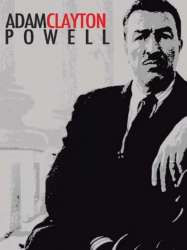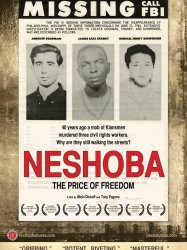You Got to Move is a film of genre Documentary released in USA on 1 january 1985
You Got to Move (1985)

If you like this film, let us know!
Released in USA 1 january 1985
Length 1h27
Genres Documentary
Themes Films about racism, Documentary films about racism, Documentary films about law, Documentary films about historical events, Documentaire sur une personnalité, Documentary films about politics, Political films
Rating73%










You Got to Move is a documentary by Lucie Massie Phenix and Veronica Selver that follows people from communities in the Southern United States in their various processes of becoming involved in social change. The film’s centerpiece is the Highlander Folk School (now known as Highlander Research and Education Center), a 75-year-old center for education and social action that was somehow involved in each of the lives chronicled in the documentary.
You Got to Move features folk, country and gospel music from the Southern United States and in fact takes its name from an old spiritual.
Featured People in You Got to Move:
Bernice Robinson
A black beautician who became the first teacher of a literacy program on Johns Island, off the coast of South Carolina, talks about teaching adults to read and write in order to pass voter registration requirements during the mid-1950s and 1960s throughout the Southern states.
“I will never forget Anna Vastine. She couldn’t read or write and it was the greatest reward when I had all the names up on the board one night, in jungle fashion, you know and I’d asked them could they pick their names out. Mrs. Vastine said, ‘I see my name,’ and she went down the list and she took the ruler from me and she said, ‘That’s Anna, that’s my first name.’ And then she went over on the other side up and down ‘til she found Vastine and said, ‘That’s my name, V-A-S-T-I-N-E ,Vastine.’ And goose pimples just came out all over me, because that woman couldn’t read or write when she came in there. She was 65 years old.”
Bernice Johnson Reagon
A college student who participated in challenging the legality of segregated public facilities in her hometown of Albany, Georgia—a student protest that grew into one of the first city-wide mass Demonstrations of the Civil Rights Movement.
“Now I sit back and look at some of the things we did, and I say, ‘What in the world came over us,’ you know? But death had nothing to do with what we were doing. If somebody shot us we would be dead. And when people died, we cried. And we went to funerals. And we went and did the next thing the next day, because it was really beyond life and death. It was really like... Sometimes you know what you’re supposed to be doing, and when you know what you’re supposed to be doing, it’s somebody else’s job to kill you.”
Bill Saunders [1]
A former worker in a mattress factory who now runs a community radio station in Charleston, South Carolina, and was involved in creating a hospital workers’ organization at the Medical College Hospital in Charleston, which organized a 100-day-long hospital workers’ strike in 1969.
“It was really an experience for me, because again, I was able to learn that there were whites tha were suffering the same way that blacks were as it relates to economics. Now, not having access to all of the restrooms, not getting into the lunchroom, they didn’t have those problems. But, actually, they weren’t making any money, and that’s where the problem lies.”
Rebecca Simpson
Fought to get damage payments for the people in her community in Cranks Creek, Harlan County, Kentucky much of whose property was destroyed by a series of floods related to strip-mining abuses; succeeded in reclaiming much of the mountainous land around Cranks Creek.
“My education was just like a big black spot in my life. I couldn’t go beyond that, I thought. I thought, probably if you try to do thing like I’ve done, you’d need, you know, like a college degree. But if you ain’t got it, you have to go on without it. So I found out you don’t have to be educated to do what you have to do.”
Gail Story and MaryLee Rogers
Two housewives from Bumpass Cove in East Tennessee helped organize community action to stop trucks from dumping hazardous chemicals in the garbage dump in their area.
“Oh mercy, five years ago, and now. Well we was jus ordinary housewives. We taught ourself to drive. We didn’t go any place that we didn’t take the kids, which was just to the grocery store and maybe to the Laundromat. We wasn’t involved in anything, not even PTA. We didn’t feel like we could donate anything. We didn’t think there was anything we could do.”
— Gail
“First thing we should say: Our mothers taught us to be good mothers and wives— that’s it. That was our role in life, you know. That’s what was taught and that’s what we did five year ago—watch soap operas. Now I don’t even get to watch a soap opera. I never see a soap opera.”
— MaryLee
Myles Horton
One of the founders of Highlander Folk School, a 50-year-old center for education and social action.
“I think the future is... well, as somebody said one time, ‘it’s out there.’ It’s not only out there, but it’s ready to be changed. It’s malleable, and there’s nothing fixed that you can’t unfix. But to unfix things that appear to be fixed, you have to not only be creative and imaginative, but courageously dedicated to the long haul.
Comments
Leave comment :
Suggestions of similar film to You Got to Move
There are 8962 with the same cinematographic genres, 10576 films with the same themes (including 50 films with the same 7 themes than You Got to Move), to have finally 70 suggestions of similar films.If you liked You Got to Move, you will probably like those similar films :
 , 1h27
, 1h27Genres War, Documentary
Themes Films about racism, Films about religion, Documentary films about racism, Documentary films about law, Documentary films about war, Documentary films about historical events, Documentaire sur une personnalité, Documentary films about politics, Documentary films about religion, Political films, Films about Jews and Judaism, Documentary films about World War II
Rating72%






Adam Clayton Powell (1989)
, 54minutesOrigin USA
Genres Documentary
Themes Films about racism, Documentary films about racism, Documentary films about law, Documentary films about historical events, Documentaire sur une personnalité, Documentary films about politics, Political films
Rating67%






Directed by Gail Dolgin
Genres Documentary, Historical
Themes Films about racism, Documentary films about racism, Documentary films about law, Documentary films about war, Documentary films about historical events, Documentaire sur une personnalité, Documentary films about politics, Documentary films about health care, Political films
Rating6%






Freedom on My Mind (1994)
, 1h45Origin USA
Genres Documentary
Themes Films about racism, Documentary films about racism, Documentary films about law, Documentary films about historical events, Documentaire sur une personnalité, Documentary films about politics, Political films
Rating79%





In 1961, Mississippi was a virtual South African enclave within the United States. Everything was segregated. There were virtually no black voters. Bob Moses entered the state and the Mississippi Voter Registration Project began. The first black farmer who attempted to register was fatally shot by a Mississippi State Representative. But four years later, the registration was open. By 1990, Mississippi had more elected black officials than any other state in the country. As the New York Times said in their review of the film, "a handful of young people, black and white, believed they could change history. And did."

The Order of Myths (2008)
, 1h19Origin USA
Genres Documentary
Themes Films about racism, Documentary films about racism, Documentary films about law, Documentary films about historical events, Documentaire sur une personnalité, Documentary films about politics, Political films
Rating68%






Neshoba (2010)
Genres Documentary
Themes Films about racism, Documentary films about racism, Documentary films about law, Documentary films about historical events, Documentaire sur une personnalité, Documentary films about politics, Political films
Rating76%





Neshoba explores the history and changing racial attitudes of Neshoba County, Mississippi four decades after the murders of James Chaney, Andrew Goodman, and Michael Schwerner during Freedom Summer. The film captures the trial of Edgar Ray Killen, who granted the filmmakers "extraordinary access".

Mississippi Cold Case (2007)
, 42minutesOrigin Canada
Genres Documentary
Themes Films about racism, Documentary films about racism, Documentary films about law, Documentary films about historical events, Documentaire sur une personnalité, Documentary films about politics, Political films
Rating55%






A Time for Justice (1994)
, 38minutesDirected by Charles Guggenheim
Origin USA
Genres Documentary
Themes Films about racism, Documentary films about racism, Documentary films about law, Documentary films about historical events, Documentaire sur une personnalité, Documentary films about politics, Political films
Rating67%





Une histoire des mouvements pour les droits civiques aux États-Unis, allant de l'assassinat d'Emmett Till en 1955 jusqu'à la loi Voting Rights Act de 1965.

Flower in the Gun Barrel (2008)
Origin USA
Genres Documentary
Themes Films set in Africa, Films about racism, Documentary films about racism, Documentary films about law, Documentary films about war, Documentary films about historical events, Documentaire sur une personnalité, Documentary films about politics, Political films
Rating80%





To a large extent, the film consists of interviews with genocide survivors, many of whom were children in 1994. In all, over thirty survivors, perpetrators, and experts were interviewed for the film. In these interviews, the survivors discuss what it means to be a Rwandan and to live next door to people who killed their families. The survivors describe how they deal with their country's request that they forgive one another and move on, so that Rwanda can rebuild and unify itself. Perpetrators' views illuminate the madness that seized the culture in 1994; exploring the experience of apologizing to victims, and examining what it is like to be looked at as a murderer in Rwandan society.

Umurage (2002)
, 52minutesOrigin Espagne
Genres Documentary
Themes Films set in Africa, Films about racism, Documentary films about racism, Documentary films about law, Documentary films about war, Documentary films about historical events, Documentaire sur une personnalité, Documentary films about politics, Political films
In Rwanda, a hundred members of the Ukuri Kuganze Association, made up in its majority by survivors of the genocide, and a few of their executioners, freed after having confessed and asked for forgiveness in 2003, meet at a reinsertion center. These executioners are going home, in most cases to the same places where they carried out their crimes, and will have to "face" their victims and ask their forgiveness. In 1994, over a space of just one hundred days, almost a million people were murdered, that makes 10,000 dead per day.
 Connection
Connection